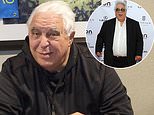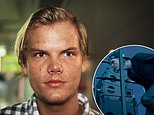Paul Burrell, 64, rings hospital bell as he reveals he has finished radiotherapy for prostate cancer in heartwarming video
Paul Burrell proudly rang the bell on a cancer ward after revealing he has completed radiotherapy treatment for his prostate cancer.
The former royal butler, 64, received treatment at The Christie Hospital as he took to Instagram on Tuesday to share the monumental moment with his fans.
In his video, the beaming star said: 'I just want to thank all the staff here for their incredible professionalism.'
Paul wrote in his caption: 'The radiotherapy treatment for my prostate cancer is now complete….onwards and upwards!
'I cannot thank the staff at The Christie enough. Their support throughout the process has been absolutely incredible.

Congratulations! Paul Burrell has announced he's completed radiotherapy treatment for his prostate cancer

Big news: The former royal butler, 64, rang the bell at The Christie Hospital as he took to Instagram on Tuesday to share the monumental moment with his fans

Good for him! Paul wrote in his caption: 'The radiotherapy treatment for my prostate cancer is now complete….onwards and upwards!'
'…..and men over 50, please ask your GP for a PSA test!
'#cancer #prostatecancer #prostatecancerawareness #prostatecanceruk #nhs #nhsheroes #thechristie #christie #menshealth #healthscreening #lorraine #itv @thechristienhs @prostatecanceruk @lorraine @itv.'
Last week, Paul admitted I'm A Celebrity All Stars 'literally saved my life' thanks to health tests before heading off to film the show in South Africa which later revealed he had cancer.
Paul, who worked beside and was a confidante of Diana, Princess of Wales, for ten years until her death in 1997, was diagnosed with the disease last summer.
Alongside eight other celebrities, Paul was in Kruger National Park in north-eastern South Africa, one of Africa’s largest game reserves to film for the first ever I'm A Celebrity series featuring previous stars of the jungle.
But after coming home to the UK, Paul was handed some heartbreaking news which followed up on some health checks taken before his trip.
Speaking to Lorraine on Monday morning, Paul said he had routine health tests before taking part in the show to give him the all clear, but doctors showed concern about raised prostate-specific antigen levels.

Support: Paul recently admitted I'm A Celebrity All Stars 'literally saved my life' thanks to health tests before heading off to film the show in South Africa which later revealed he had cancer

Candid: Alongside eight other celebrities, Paul was in Kruger National Park in northeastern South Africa, one of Africa’s largest game reserves to film for the first ever I'm A Celebrity series featuring previous stars of the jungle
He spoke to his GP about the results to enquire about his ability to still take part in the show but was told he was fine to wait until returning home to investigate the issue further.
He joked with Lorraine Kelly about the last time he was on the show, admitting it was 20 years prior when he was 'a lot thinner, a lot younger' and married with kids.
Paul went on to say: 'I'm A Celebrity literally saved my life, because I went for the medical, they found a raised PSA level.
'I went to my GP and I said to him, "Am I still able to do the show?"
'And he said "Look, this can wait until you get back, and when you get back we'll continue with the investigations."
'So when I got back, then I had an MRI scan, then I had biopsy, then they told me they had cancer.'
Paul was the runner-up of the fourth series of I'm A Celebrity... Get Me Out Of Here! in 2004.
He later said that he is 'so grateful' to ITV for picking him to take part in the jungle, and described how he is 'emotional' but is looking forward to the end of his radio therapy sessions, to which he has five left.

Throwback: Paul was the runner-up of the fourth series of I'm A Celebrity... Get Me Out Of Here! in 2004

Chat: But after coming home to the UK, Paul was handed some heartbreaking news which followed up on some health checks taken before his trip

Open: Speaking to Lorraine on Monday morning, Paul said he had routine health tests before taking part in the show to give him the all clear, but doctors showed concern about raised prostate-specific antigen levels
'I would still be sat here today not knowing I had cancer growing inside of me. So my journey is a happy one,' Paul gushed.
'It's a rollercoaster of emotions and you just don’t know what’s going to happen to you next.
'And combining that with hormone therapy, which doesn’t help, I get hot sweats and I’m very emotional and very tired, so it's a tough experience to go through but I'm getting through it.'
Paul then brought viewers along to the hospital as he began his cancer treatment. Seen leaving the home he shares with husband Graham Cooper, Paul said, 'It's almost six o'clock in the morning.
'It's time for me to go to hospital to have my operation. Coop can't come with me because of the radiation. And so I'm gonna do this bit by myself.'
Speaking from The Christie Hospital in Manchester, the former Royal butler later added, “I'm really nervous about this. I know it's like going to the dentist, so it’ll be over very soon, but it's a life-changing thing that's happening to me this morning.”

Heartbreaking: He spoke to his GP about the results to enquire about his ability to still take part in the show but was told he was fine to wait until returning home to investigate the issue further

Distraught: He later said that he is 'so grateful' to ITV for picking him to take part in the jungle, and described how he is 'emotional' but is looking forward to the end of his radio therapy sessions, to which he has five left
After the two-hour procedure, in which he had radium injected into his prostate to shrink his tumor, Paul, 64, admitted, 'I don't know what I was worried about because I didn't feel a thing.'
Viewers then saw Paul having his first radiotherapy treatment at the hospital, using a state-of-the-art cone beam CT scanner that checks the pelvis and then delivers the radiotherapy.
He said afterwards, 'I’ve just had my treatment, one of 15, and I didn't feel a thing. It was just like lying on a sunbed.'
Heaping praise on the staff who are caring for him, he added, 'The team here has been so supportive. They're incredible. And every time I come here, there's a warm smile and a welcome which just helps me get through it.'
Paul previously said he is worried he won't be alive at the end of the year after being diagnosed with prostate cancer last summer.
He said: 'I’m tired, I’m on hormone therapy, it’s robbing me of my testosterone so my beard isn’t growing as it should, I’m tired, and I’m getting hot flushes.

Confidante: Former royal butler Paul, 64, worked beside and was a confidante of Diana, Princess of Wales, for ten years until her death in 1997 (pictured together in August that year)
'I'm on an emotional educational rollercoaster and not knowing where I'm going to be...
'Thinking "Am I going to be here next year [for Christmas]?" ... I told my boys and they said "Dad, we need to spend more time with you".'
Paul explained he had been for a medical last year and underwent a 'full MOT', with a PSA test - which can detect prostate cancer - showing 'fairly unusual' levels, prompting his GM to send him for an MRI scan, which showed a shadow on his prostate.
While he feels 'so tired', he believes he's fortunate it was caught early and wants to raise awareness of the disease.
Most watched News videos
- Scottish woman has temper tantrum at Nashville airport
- Tesla Cybertruck explodes in front of Trump hotel in Las Vegas
- Mass panic as New Orleans attacker flies down Bourbon street
- Shocking moment zookeeper is fatally mauled by lions in private zoo
- Horrific video shows aftermath of New Orleans truck 'attack'
- Meghan Markle celebrates new year in first Instagram video
- Tesla Cybertruck burns outside Trump hotel in Las Vegas
- See how truck that drove into crowd made it through police barrier
- Cheerful Melania Trump bops to YMCA at Mar-a-Lago NYE bash
- New Orleans terror attack suspect reveals background in video
- Plane passenger throws drink at flight attendant in boozy fight
- Horrifying moment yacht crashes into rocks and sinks off Mexico coast





























































































































































































































































































































































